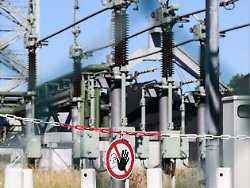Millions of jobs at risk
Study: Gas stop could destroy twelve percent of GDP
6/28/2022 1:36 p.m
In mid-June, Russia throttled its gas supplies to Germany for the first time. If the Kremlin cuts off the supply completely, the German economy could face catastrophic consequences. Germany is suddenly unattractive as a location for energy-intensive companies.
According to several studies, Germany would suffer particularly badly from an abrupt halt to Russian gas supplies. A gas stop could cost 12.7 percent of economic output, according to a study commissioned by the Bavarian Business Association (VBW) out. The consequences for the labor market would be devastating: “Arithmetically, about 5.6 million jobs would be affected by the consequences,” said VBW CEO Bertram Brossardt.
Sectors such as the glass industry or steel processing are therefore particularly threatened. “There we have to assume that the added value will drop by almost 50 percent,” said Brossardt in the event of a gas stop. “The same applies to the chemical, ceramics, food and textile industries as well as printing. Here the value-added losses are over 30 percent.”
According to the VBW, the reason for this is that gas storage tanks are preferred to industry for delivery because they have to contain statutory minimum quantities. Private households and institutions such as hospitals are also given priority when it comes to supply. Should there be a gas ban, not even half of the industry’s needs would be covered.
Germany is becoming unattractive as an industrial location
Due to its dependence on Russia for energy supply, Germany loses competitiveness even without a gas freeze. In another study, the Mannheim research center ZEW comes to the conclusion that energy prices have risen since the beginning of the war, especially in Germany and the Netherlands. The price increases in the USA and Canada are more moderate, they say. In Japan, no effects are noticeable.
In Europe, the situation is much better in France because of the special importance of nuclear power and in Switzerland because of hydroelectric power, the study also shows. Dependence on Russia is even greater in EU countries such as Austria, Finland, Hungary, Slovakia and the Czech Republic. However, their overall energy requirements are smaller and therefore easier to replace than in Germany or the Netherlands. This makes Germany less attractive, especially for energy-intensive companies, is the conclusion of the study.
Pass on procurement costs to consumers
The Kiel Institute for the World Economy (IfW), the Munich Ifo Institute, the Essen RWI and the IWH Halle paint a bleak picture. If there is an immediate stop in deliveries, there is a 20 percent probability of a gas shortfall of at least 23.8 terawatt hours (TWh) in the coming year – “in the very unlikely worst case, almost 160 TWh will be missing”. The resulting loss of production in the gas-intensive industries and their immediate customers would result in a loss of added value of around 46 billion euros, which in the worst case could rise to 283 billion. This corresponds to 1.6 or 9.9 percent of German economic output in 2021.
According to the institutes, it is absolutely necessary to pass on the increased procurement costs of companies to consumers in a timely manner. “Because then the energy consumption drops.” Since higher prices already provide a strong incentive for savings, additional government premiums are not necessary. Instead, households in need should be supported through targeted transfers.
“The overall economic losses are likely to be significantly greater, since the direct effects would be amplified economically,” the economists warn. “In addition, households would lose purchasing power as a result of higher energy prices.” In a previous analysis in April, the institutes had estimated the overall economic effect a good three times as high as that on directly affected industries.
